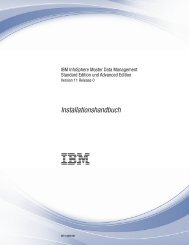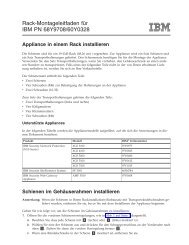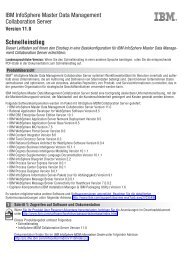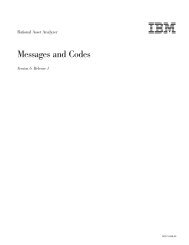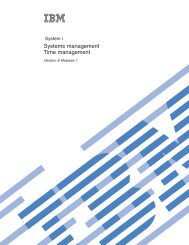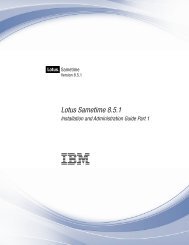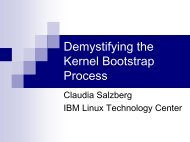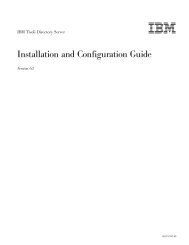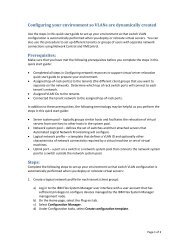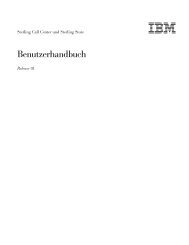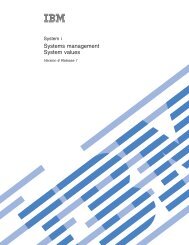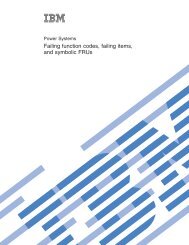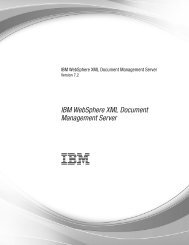System i: Programming Secure Sockets APIs - IBM
System i: Programming Secure Sockets APIs - IBM
System i: Programming Secure Sockets APIs - IBM
You also want an ePaper? Increase the reach of your titles
YUMPU automatically turns print PDFs into web optimized ePapers that Google loves.
Qso_OverlappedIO_t * communicationsArea (Input/Output)<br />
A pointer to a structure that contains the following information:<br />
descriptorHandle (Input) - The descriptor handle is application-specific and is never used by the system.<br />
This field is intended to make it easier for the application to keep track of information<br />
regarding a given socket connection.<br />
buffer (Input) - A pointer to a buffer of data that should be sent over the socket.<br />
bufferLength (Input) - The length of the data to be sent.<br />
postFlag (Input) - The postFlag indicates if this operation should be posted to the I/O<br />
completion port even if it completes immediately.<br />
v A value of 0 indicates that if the operation is already complete upon return to the<br />
application, then do not post to the I/O completion port.<br />
v A value of 1 indicates that even if the operation completes immediately upon return<br />
to the application, the result should still be posted to the I/O completion port.<br />
postFlagResult (Output) - This field is valid if gsk_secure_soc_startSend() returns with 1 and postFlag<br />
was set to 1. In this scenario, postFlagResult set to 1 denotes the operation completed<br />
and been posted to the I/O completion port specified. A value of 0 denotes the<br />
operation could not be completed immediately, but will be handled asynchronously.<br />
fillBuffer (Input) - Only used on gsk_secure_soc_startRecv() or QsoStartRecv(). Ignored on<br />
gsk_secure_soc_startSend().<br />
returnValue (Output) - If gsk_secure_soc_startSend() completes synchronously (return value equals<br />
GSK_OK), then this field is set to GSK_OK and field secureDataTransferSize indicates<br />
number of bytes sent.<br />
errnoValue (Output) - When the operation has completed asynchronously and returnValue is<br />
GSK_ERROR_IO, this field will contain an errno further defining the failure.<br />
operationCompleted (Output) - If the operation is posted to the I/O completion port, this field is updated<br />
to indicate that the operation was a GSKSECURESOCSTARTSEND.<br />
secureDataTransferSize (Output) - Number of bytes sent when gsk_secure_soc_startSend() completes<br />
synchronously (function return value equals GSK_OK).<br />
bytesAvailable Not used.<br />
operationWaitTime (Input) - A timeval structure which specifies the maximum time allowed for this<br />
operation to complete asynchronously.<br />
struct timeval {<br />
long tv_sec; /* second */<br />
long tv_usec; /* microseconds */<br />
};<br />
If this timer expires, the operation will be posted to the I/O completion port with<br />
errnoValue set to EAGAIN.<br />
If this field is set to zero, the operation’s asynchronous completion will not be timed.<br />
If socketDescriptor is closed before the operation completes or times out, the operation<br />
will be posted to the I/O completion port with errnoValue set to ECLOSED.<br />
The minimum operationWaitTime is 1 second. The microseconds field (tv_usec) in the<br />
timeval is not used and must be set to zero.<br />
postedDescriptor Not used - Must be set to zero.<br />
operationId (Input) - An identifier to uniquely identify this operation or a group of operations. It<br />
can be set with the return value from QsoGenerateOperationId() or with an<br />
application-defined value.<br />
This value is preserved but ignored by all <strong>APIs</strong> except QsoCancelOperation() and<br />
QsoIsOperationPending().<br />
reserved1 (Input) - Must be set to hex zeroes.<br />
reserved2 (Input) - Must be set to hex zeroes.<br />
<strong>Secure</strong> <strong>Sockets</strong> <strong>APIs</strong> 57



